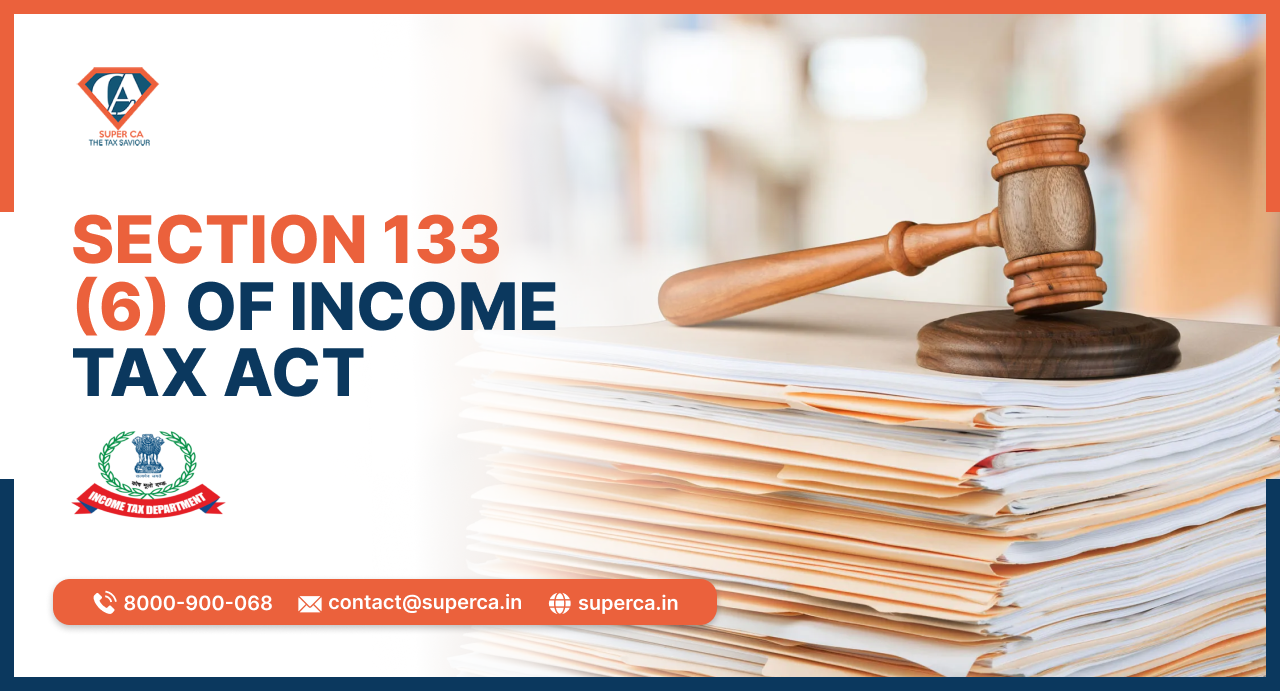Posted By : Super CA on 26 June
Under Section 136 (6) of the Income Tax Act, an assessing officer is granted investigative powers. The investigating powers may include the power to demand information that is related for proceedings under the Income Tax Act or the power to make enquiries and verifications of deposits of cash under the “Operation Clean Money.” The assessing officers also have the power to issue a notice in order to acquire general information for enquiries in cases where there are no pending liabilities of income tax or other related obligations. In this article, we will learn about these powers under Section 136 (6) of the Income Tax Act.
Provisions of Section 136 (6) of the Income Tax Act
The features and provisions that are mentioned under Section 136 (6) of the Income Tax Act are listed as follows:
- Under Section 136 (6) of the Income Tax Act, a notice can be issued/distributed by any individual, even the assessee.
- According to the provisions of Section 136 (6) of the Income Tax Act, the information that is asked for in any matter must be relevant for an enquiry or proceedings under Income Tax Act according to the authorities.
- The information that is asked for may not necessarily be always for pending proceedings, but to identify whether the proceedings under Income Tax Act are pending or not.
- The information can be asked for in order to check if the proceedings are pending or not and may be asked for pending proceedings.
- The information can be asked for at any time because there is no time limit framed by the income tax act.
Eligibility criteria for Section 133 (6) of Income Tax Act
According to Section 133 (6) of Income Tax Act, the power to call/ask for information can be given to the following:
- The power can be given to an Assessing Officer or Joint Commissioner or Commissioner under Sub-Sections 1 to 5 of Section 133 (6) of Income Tax Act.
- Under Section 133 (6) of Income Tax Act, the power to ask for information can be provided to either the Assessing Officer, Joint Commissioner or Commissioner, Director General or Chief Commissioner and Director of Commissioner.
- Under Section 90 of income tax act for Double Taxation Avoidance Agreement(DTAA), the powers that are provided under Section 133 (6) of Income Tax Act, can only be permitted by an authority who has a higher rank than the Assistant Commissioner or the Assistant Director according to Section 131(2) of income tax act even when no proceedings are in pending.
Call for Action
Under this section, the officers that are listed below are granted powers to call for information:
- Any individual who is mentioned under Section 2(31) of Income Tax Act including any concerned officer or any banking officer.
- Any individual from the list of those people who have ,ade recurring deposits either more than or equal to Rs. 50000 with their addresses mentioned in the co-operative banks.
- Any individual who has valid reason to believe to be a trustee or agent or guardian in order to avail him/her with returns of names of the people(who are either trustees or guardians or agents) and their respective addresses.
Types of information that can be asked for under Section 133 (6) of Income Tax Act:
The information that can be asked for as it can be essential for proceedings under Income Tax Act can be
- Related to the information on “such points” or “Matters”
- In order to produce the statements of affairs and accounts which are verified in a specified manner by the authorities that were specified above
Terms and conditions for Section 133 (6) of Income Tax Act
The following terms and conditions can be applied under Section 133 (6) of Income Tax Act:
- Section 133 (6) of Income Tax Act provides the power to ask for information only when the Director of Investigation or the Commissioner of Income Tax approves.
- The notice is generated by the ITD system and hence there is no need to submit a handwritten notice.
- As per Section 133 (6) of Income Tax Act, a person under verification must reply to the notice through online modes.
- The verification about the SOP under “Operation Clean Money” needs to be made via Online verification portal.
- If the individual under verification does not reply to the notice within the stipulated time period as specified by the Assessing Officer in relation to cash deposits in bank accounts, then the case will be considered as “Not Acceptable” and then, actions will be taken according to the procedure mentioned in the SOP of CBDT.
Conclusion:
As per the information given in the blog about Section 133 (6) of Income Tax Act, it is clear that the Assessing Officer is granted some powers by the higher authority in order to ask for information that is related to the proceedings under Income Tax Act.




